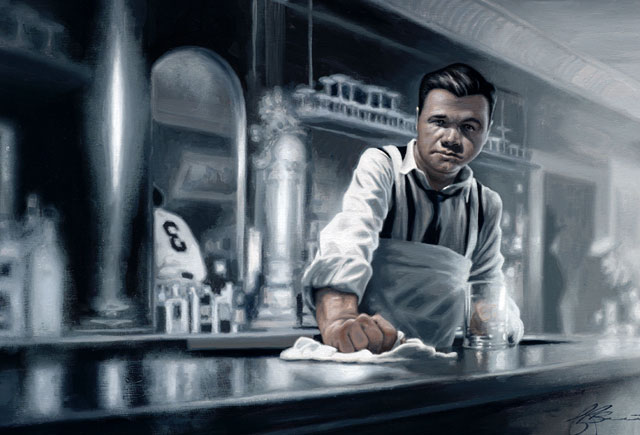Posted by Os Davis in alternate history, baseball, Review, short stories, Sports | 0 Comments
What if, Babe? A review of Harry Turtledove’s “The House that George Built”
Nowhere do the seemingly mutually exclusive entertainments of sport and science-fiction come closer than in that simple musing question “what if…?”
In sport, the question is often lamentably formed of second-guessing the decision of manager, general manager, umpire or player. To wit:
Such useless speculation is simultaneously masochistic obsession and cold comfort, bringing thought that only unjust referees snapped Team USA’s run in Olympic basketball in 1972 or that Bobby Thompson luckily outguessed Ralph Branca and Rube Walker on a single pitch in ’51 or a million other variations on the theme. “What if” can allow the faithful to believe in face of the facts – and sports are one of the rare things in life that produce a definitive conclusion – that their side was, in fact, the best on a given day, season, etc.
In science fiction, an entire subgenre has been spawned from the “what if” notion, with stuff from The Man in the High Castle to Watchmen
toying with ideas of alternate history. The interesting difference: In science fiction, the “what if” is asked by the winners.
According to Robert Cowley and the editorial staff at MHQ: The Quarterly Journal of Military History (they of the excellent What If? books), the events most rife for “counterfactual” scenarios in their field are the American Civil War and World War II. The span of literary and popular-media science fiction would, at a guess, reflect this ranking – and BuckBokai hasn’t seen too many sympathizers producing mass-distributed stuff from Confederate or Nazi sides, Birth of a Nation notwithstanding.
Which brings us to Harry Turtledove’s “The House that George Built,” a speculative fiction centered on the legendary Sultan of Swat his bad self. Tor online has graciously made this tale of six or so pages freely available, so click on the link to read it. BuckBokai is hereby no longer responsible for revealing any spoilers…
While many sports-centered “what if” scenarios involve on-field actions which subsequently resonate through history with sweeping differences, Turtledove reminds us that off-field activities count, too. The question “What if Scott Norwood makes the field goal?” can be just as rife for speculative fodder as, say, “What if contractual obligations had messed with a player’s career?”
Through the omniscient narrator and a stroll to the local pub by H.L. Mencken*, we meet an alternate-world George Herman “George” Ruth, marred by a single decision from the game in which he became a local legend.
Turtledove is no stranger to alternative fiction, having taken on the two popular events mentioned above plus World War I in series; he executes the alternate history deftly inside of the tight, sparing pages, complete with dominant player and team in lieu of those powerhouse New York Yankees – BuckBokai won’t spoil this particular part and will merely say it’s a good bit.
The prose shows both a wonderful sense of pre-war era Baltimore and an affection for Mencken – perhaps taken on by Turtledove when researching the Worldwar books via the Nietzsche connection – spun through the classic Where Everybody Knows Your Name milieu. And Turtledove manages to confront, though not succumb to, that no. 1 enemy of alternate-history prose: Irony. How does the fiction writer put forth the truth that this Ruth is a never-has-been without descending into cliché? Somehow “House” pulls it off.
All in all, “The House that George Built” is a gem.
And yes, the Milwaukee Creams is a brutal name for a ball club.
(*Mencken’s first published work, referenced but unnamed in “The House that George Built,” was about the 1894 Baltimore Orioles and is entitled “Ode to the Pennant on the Centerfield Pole,” but BuckBokai cannot find it online … can anyone assist?)


